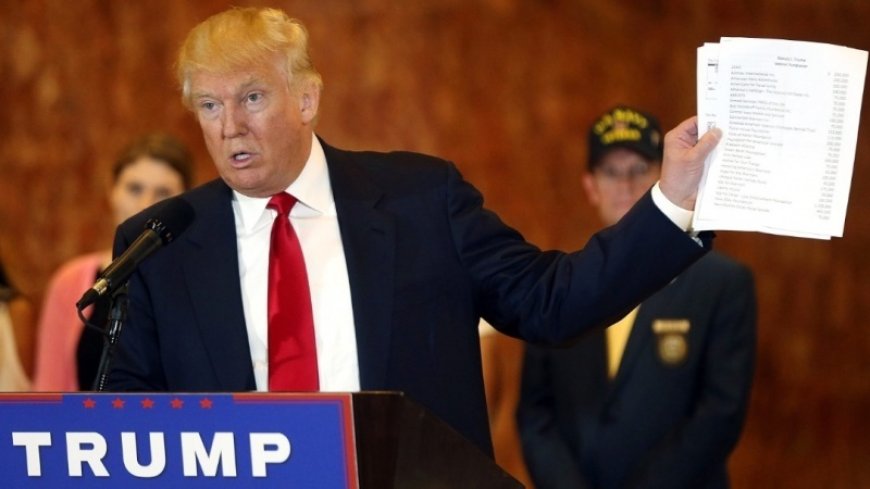A Perilous Example for Free Expression: Trump's Legal Fight Against the Media
There is every reason to be concerned about the future of free speech in America in light of the recent complaints lodged by US President-elect Donald Trump against numerous media outlets, including reputable publications like the Des Moines Register. Many see this as just another example of politicians and journalists but it may be the start of a worrying trend that will make the media less effective in checking power and silencing others who disagree.

There is every reason to be concerned about the future of free speech in America in light of the recent complaints lodged by US President-elect Donald Trump against numerous media outlets, including reputable publications like the Des Moines Register. Many see this as just another example of politicians and journalists but it may be the start of a worrying trend that will make the media less effective in checking power and silencing others who disagree.
The Guardian states that Trump's grievances extend beyond the substance of news articles and are an integral aspect of a larger plan to muzzle critics. His lawsuit charging the Des Moines Register and its pollster, Ann Seltzer, of meddling in the election is one of his most contentious legal actions. The problem? The stage was set for yet another high-profile legal dispute when the newspaper released a poll showing that Trump's approval rating in Iowa was significantly lower than he had stated. But the possibility that these lawsuits may silence the media is more worrisome than any chance that they will succeed.
Legal action, even if it fails, can have a significant influence on smaller media sites. Many of these outlets simply do not have the financial resources to handle the financial burden of a lawsuit, regardless of its validity. This is the truth, and it might make these media companies self-censor or stop reporting on controversial subjects completely. The fear of legal action discourages journalists from publishing material that could anger powerful people like Trump, as pointed out by The Guardian.
Trump's aggressive legal strategies extend beyond specific lawsuits. He has recently established a risky precedent with his $16 million settlement with ABC News. The deal may appear to be a simple conclusion, but it shows that Trump may now regard the courts as a tool to censor dissenting opinions. Proponents of free speech have expressed concern that this could lead to further legal action against the media by Trump and that ABC News is showing signs of giving up. There is genuine worry that these private grudges will intensify as Trump prepares to assume office again, causing a sea change in the dynamic between the administration and the media.
The bigger picture for the media's capacity to hold powerful people responsible is at stake here, not merely the particular lawsuits themselves. No sitting US president, including Trump, has ever sued members of the media on an individual basis while in office. Nevertheless, Trump has previously expressed his desire to alter that dynamic. His words give the impression that he intends to use his full political authority to penalize and intimidate journalists if he returns to the White House, and to escalate this legal fight even further.
Trump has threatened the media in several ways, including lawsuits and the possibility of revoking the licenses of networks whose coverage he finds objectionable. It is well-known that he has a strong dislike for critical media. His threats to arrest journalists or investigate news organizations for treason show that he wants to change the media to suit his own interests. These measures are intended to consolidate control and quell any dissent, not only to safeguard his reputation.
The fact that Trump's strategy for handling the media extends beyond his vengeful ambitions is what really worries me. Underlying his techniques is a larger political goal of limiting the press's capacity to question power. This is more than just partisanship; it endangers the fundamental essence of a press that is free and independent. In a democratic society, the press plays a crucial role in holding the powerful to account; nevertheless, this accountability is rendered null and void when the press is stifled or forces itself to censor.
The press has an essential role in American culture, and some say that Trump's actions show a clear misuse of power. These lawsuits have the potential to intimidate influential persons into being more careful with their reporting if they are successful. Anyone who believes in the importance of free speech and a press that is not beholden to any one government should find this development deeply concerning.
Legal disputes between Trump and the media may have far-reaching effects that go well beyond Trump's presidency. Should this strategy of legal intimidation succeed, it could set a dangerous precedent for future administrations, allowing any leader with the resources to use the courts as a tool to suppress dissent and control public discourse. The public and media must be ever-vigilant in protecting the freedom to question individuals in authority, as this has far-reaching consequences for free speech and democracy.













































